
Types Tuesday
by Guest Contributor Oscar Harding
There is no other character in all of film and television like The Doctor from Doctor Who.
Countless actors have delivered unique and differing interpretations of everyone from Hamlet on stage to The Joker on film, Blanche DuBois to Hannibal Lecter. Sometimes characters in TV series like Eastenders or Film franchises like The Avengers are recast.
But The Doctor changes appearance, and retains all past memories. Every actor who has played The Doctor is also playing everyone who has come before them.
It is a fascinating anomaly and means The Doctor has, at some point throughout the show’s 53-year history been every single one of the “Power Of…” character types.What is particularly interesting is that in some way, the defining characteristics of each incarnation are a direct result of how their predecessor died.
The logic of the Regeneration concept allows for this unique quirk no other fictional character is able to do. With the latest actor to play the role, Jodie Whittaker, recently being announced, and the current actor, Peter Capaldi, about to finish his time in the role, it seems like a good time to look at an incarnation of the Doctor who has embodied each of the 9 character types.
BE WARNED! Major spoilers follow for every era of Doctor Who.
Power of Love
The First Doctor (William Hartnell) was introduced as a grandfather who fled his home planet with his Granddaughter, Susan. Every dangerous adventure he undertakes is occupied by a need to protect Susan as much as he also wants to show her the Universe and broaden her horizons. Susan eventually decides to stay with a man she meets on one of their adventures, and though it is heartbreaking for The Doctor, he realizes that letting Susan stay is the safest option for her.
Every dangerous adventure he undertakes is propelled by a need to protect Susan as much as he also wants to show her the Universe and broaden her horizons. Susan eventually decides to stay with a man she meets on one of their adventures, and though it is heartbreaking for The Doctor, he realizes that letting Susan stay is the safest option for her.
He may be remembered as grumpy, but almost every action of this incarnation is motivated by love, even if it doesn’t initially seem like it. This Doctor, despite his appearance, is young and everything he does is for his companions. He isn’t the embittered, battlescarred Doctor we meet later on in the show’s history.
His iconic speech as he bids his Granddaughter farewell shows the love and admiration he has for her:
Power of Ambition
The Third Doctor (Jon Pertwee) is the result of his predecessor being forced to change appearance against his will, and he wakes up, without his transport, and exiled to earth. He ultimately wants to be accepted by the military taskforce who have hired him, and to return to him people and be accepted by them.
His flamboyant action-hero persona is a cover for a lonely man who just wants acceptance. A classic Power of Ambition character, but one who is justified in his behaviour. His predecessor was forced to regenerate and exiled by his own people. Of course the Third Doctor would be Power of Ambition- the way he was born wouldn’t allow him to be anything else.
In this video him with his typical Power of Ambition attitude towards others:
Power of Will
Just one look at the outfit of The Sixth Doctor (Colin Baker) tells you everything you need to know about him. His predecessor looked young and acted young. Full of wonder and naivety, he saw the best in people and sacrificed his life to save his companion. Born from selflessness, The Sixth Doctor is brash and rather jarring- he is hard to like until you really get to know him.
Like any Power of Will character, he has the capacity to be boorish and abrasive, which can be as much of a strength as it is a weakness. This particular personality becomes The Doctor’s downfall as he is put on Trial by his own people (again) and pays for it with his life. Power of Will characters believe it is better to burn out than to fade away, and as the below video demonstrates, The Sixth Doctor takes no prisoners and offers no apologies for being Power of Will:
Power of Reason
Having made so much noise in his previous form, The Seventh Doctor (Sylvester McCoy) learns from his most recent mistakes by opting for a more calculated, cerebral approach to saving the Universe. As time has gone on, fans and critics alike have praised this darkest of Doctors. Power of Reason characters see everything as a challenge or a puzzle to be solved, and The Seventh Doctor is a big fan of chess, playing everyone off against each other to save the day, be they friend or foe.
Acting the utter fool as a front, this incarnation was a master strategist, reveling in obstacles to overcome and not stopping often enough to think of those who were pushed aside in his quest to find resolution. Ultimately, this drive to outwit everyone would define the character for years to come, as the actions of The Seventh Doctor inadvertently caused The Time War- more on that shortly.
This video, showing The Doctor talking himself out of a gun being pointed in his face, is an excellent example of a Power of Reason character at work:
Power of Idealism
The Eighth Doctor (Paul McGann) cut a dashing, Byronic figure. A handsome romantic forever searching for adventure and that next high. He couldn’t be more of a Power of Idealism character, which makes his death all the more tragic. He regenerated from his cold, calculated predecessor on New Year’s Eve, 1999 and was immediately thrown into a race against time to save reality itself, without a moment to pause for breath. He had a love of the finest things in life, and was very much like the great Romantic poets like Shelley.
It was this lust for life which made him blind to the machinations going on in the Universe that resulted in The Time War, a devastating conflict that raged across every dimension. True to his Power of Idealism characteristics, he chose to ignore the conflict, except to play the hero and help those caught in the crossfire, though never interfering because that would involve difficult choices- being a warrior would be beneath him. Ever unique, he would “help where I can. I will not fight.” It was this refusal to try and stop the War that brought about his demise, as he tries to save just one person instead. Forced the regenerate, his end is perhaps the most heartbreaking of all the incarnations, as he tells those who would engineer his rebirth:
I don’t suppose there’s any need for a Doctor anymore. Make me a warrior.
You can watch the whole tragic ending in the video below:
Power of Imagination
Great men are forged in fire. It is the privilege of lesser men to light the flame.
The War Doctor (John Hurt) might be the most interesting incarnation of them all, and not just because he is the one we know the least about. Literally born out of necessity, he was conditioned for conflict and refused to take the name of “The Doctor” as he became a commander in The Time War. Everything we have seen and read of him, however, shows him to be reluctant- to fight, to kill, to forgive himself, even to accept that he is just as much “The Doctor” as everyone who came before and after him.
The War Doctor is every bit the reluctant hero, forced into existence and on an epic quest to end the greatest war in all of creation. Like any Power of Imagination character, greatness is thrust upon him, despite his protestations that he is the “Doctor No More”. There are incarnations that would take this quest on with swagger, many of them citing pacifism and choosing not to let anyone die because of their actions, but not The War Doctor. Forever doubting his is good and heroic, he is exactly like Frodo Baggins or Luke Skywalker, other classic examples of Power of Imagination characters. Exhausted by centuries of war, and having saved the day, this hero gets a happy ending as he regenerates, knowing he can proudly call himself The Doctor again.
The below video shows The War Doctor faced with his greatest decision, which could end the War but wipeout his home planet:
Power of Excitement
Power of Excitement characters are the life and soul of the party, and The Tenth Doctor (David Tennant) is relentlessly fun to be around, and a real ladies’ man. But he never dares to look back, or stops to think that he can’t always be the hero. When he reflects on heartbreak or lets down his facade of constant cheeriness and optimism, it is in the most dramatic fashion. Everything he does is with flair, and in pursuit of adventure, but more often than not it is at the cost of those whose paths he crosses. Despite being a hero, like a Power of Excitement character always is, The Tenth Doctor is an agent of chaos.
Ultimately, this thrillseeking incarnation is a deeply tragic character because he rarely stops to reflect on his actions until it is too late. He was born from a predecessor haunted by his actions in the Time War who found love in Billie Piper’s Rose Tyler. That love is amplified when he turned into the Tenth Doctor.
At the end of his life, sacrificing himself to save his friend Wilf (Bernard Cribbins), his regeneration is the most destructive and explosive because he held off the process for so long. His parting words were “I don’t want to go” and he seems to be the personification of Dylan Thomas’ quote “rage, rage against the dying of the light”.
The below video shows the reckless dark side of this archetypal Power of Excitement character at work, as he defies the very laws of time:
Power of Truth
The Eleventh Doctor (Matt Smith) came into existence after his predecessor, all alone, finally gave in and regenerated. He was literally given a baptism of fire, his TARDIS in flames and crashing towards Earth. After such a dramatic entrance, he is immediately faced with a multitude of mysteries he must solve, and even when he tries to ignore intrigue, this Doctor must turn detective for the good of those around him.
He finds a family after suffering so much loss as his previous incarnation, and the only way he can keep them safe is to pursue the conspiracies that seem to surround him. Ancient religious orders determined to kill him, a woman who claims to be his wife popping up all over his timelines, and cracks in the skin of the universe that threatens to consume everything. Facing similar challenges as his predecessor, Seventh Doctor, this incarnation has to be cunning, quickwitted, and always alert. The irony is it is this very characteristic is what brings about his end, which haunts him all the way at the start. His era gets very confusing, which seems appropriate for a quintessential Power of Truth character like The Eleventh Doctor.
The below video shows us what happens when a Power of Truth character is proved right, and he gets to the bottom of a mystery. It’s not pretty…
Power of Conscience
The Twelfth Doctor (Peter Capaldi) began his time in the role obsessed with the question “Am I a good man?”. By the end of his life, desperately trying to save a community of colonists from an army of Cybermen, and stranded with two incarnations his best friend and worst enemy, The Master, he gave a defining speech when confronting them as they fled the chaos, which can be viewed in the video below. It speaks volumes to his character, and is the most obvious evidence that he is a Power of Conscience character through and through.
He started out as a bitter man, his predecessor stranded on Trenzalore for hundreds of years, protecting the planet from swarms of enemies and ending it all from sheer exhaustion. But this incarnation’s face was familiar- in fact, it is the face of a man he saved many years before. It was a reminder to himself to do what is right, no matter the cost. He may have been harsh like the Sixth Doctor at times, but came to prove that despite his gruff exterior, he had a heart the size of The First Doctor. No other incarnation has beat himself up so much about doing the right thing, and never letting injustice occur. Power of Conscience characters think about nothing else, and The Twelfth Doctor is no exception. He thought less of adventure, and more about what it means to be The Doctor- a good man.
What’s Next?
We won’t get our first glimpse of The Thirteenth Doctor (Jodie Whittaker) until Christmas, and we won’t get to know her character until late next year, so it’s impossible to guess what type she will be. But if the conditions of her predecessor’s demise are anything to go by, she could very well be a Power of Love character. Only Time (and Space) will tell.
For more examples of all the character types, you can purchase the in-depth e-books at the ETB shop, or you can read more articles on all the “Power Of…” types including James Bond, Batman and Sherlock Holmes, every Tuesday.
And if you want to start an argument about guest contributor Oscar Harding’s analysis please post in the comments section!
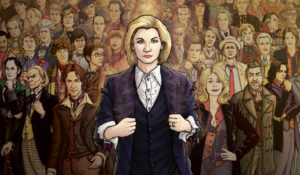
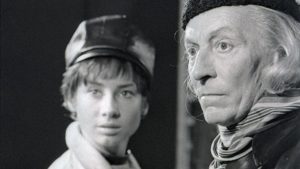
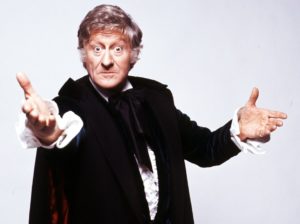
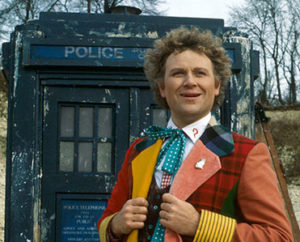
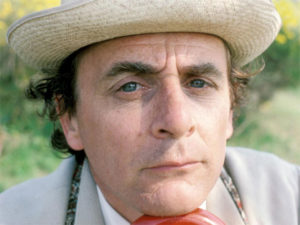
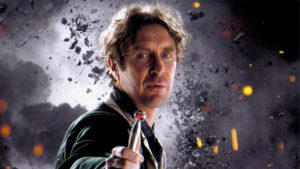
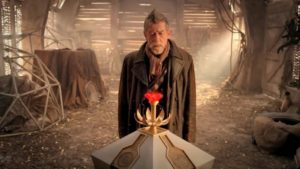
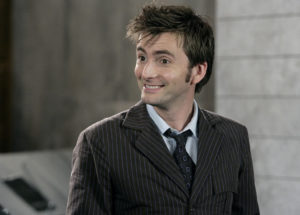
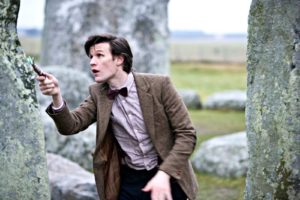
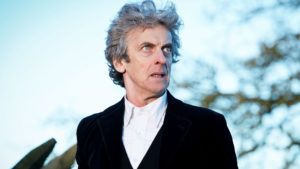
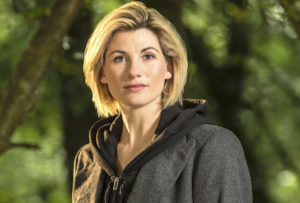






No comment yet, add your voice below!